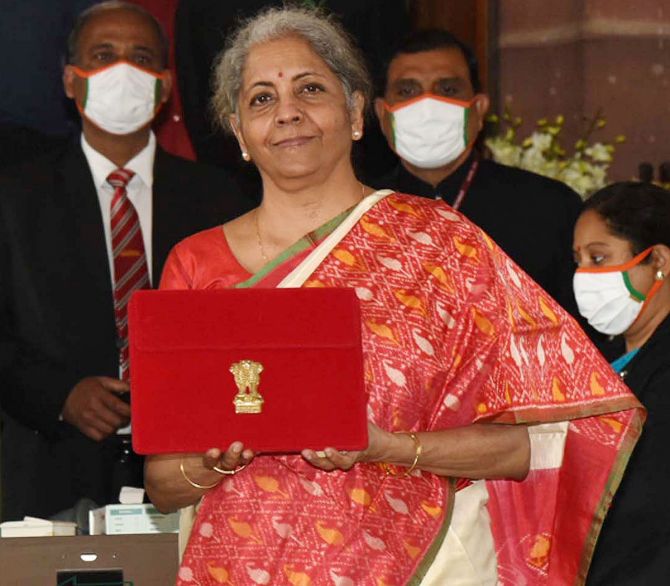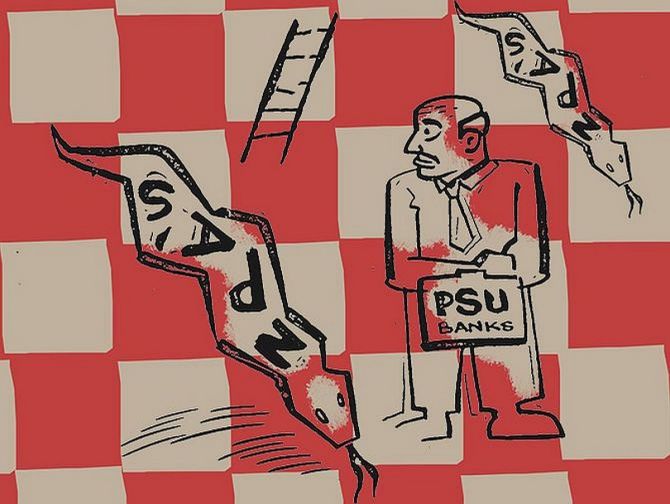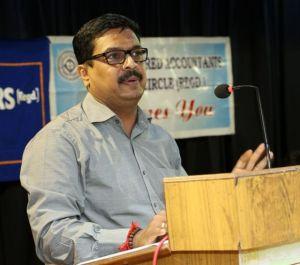'The government has realised that the finances of the government are in a precarious state.'
'We are borrowing to fund the ever-burgeoning revenue deficit.'
'Then you are paying interest on the fresh borrowing.'
'For the first time, the government has realised that this cannot go on.'

India Inc is happy with Finance Minister Nirmala Sitharaman's third Budget.
The stock market is ooming.
As expected, the Opposition does not see anything impressive in the Budget.
As for the tax paying common Indian, s/he must be relieved at the absence of any new levy that would burden her/him.
"If the government keeps away from businesses, it will benefit the economy," chartered accountant and advocate M R Venkatesh, who has been critical of the Modi government's recent Budgets, tells Shobha Warrier/Rediff.com.
They say it is a historic Budget as it is paperless...
It is neither historic or pre-historic; it is the compulsion of our times. And it is high time we did what we did in the current Budget.
In the whole of India, probably 10 people including yours truly read the entire Budget from the beginning till the end of around 2,000 pages! And it takes two or three weeks to go through it.
And for that, why print thousands of copies?
So, I would call this a good transition; from paper to digital.
If you look at the contents of the Budget, is it historic?
This Budget signifies two things.
Death of Nehruvian Economics. And the government has realised that the finances of the government are in a precarious state.
We cannot be running yojanas after yojanas hoping that somebody will fund it.
There is a limit to milking the horn of a bull.
And believe me, here I am not talking about the udder of a cow!
We have reached the optimum stage on a variety of issues in raising taxes and revenues.
As for the expenses, you seem to have an ever-growing dhobi list.
Consequently, there is a gargantuan revenue deficit.
And we are borrowing to fund the ever-burgeoning revenue deficit.
Then you are paying interest on the fresh borrowing.
But we do not know what to do, and how to solve this macro-economic conundrum.
For the first time, in my opinion, probably the government has realised that this cannot go on.
So, they have decided to start selling the assets, divest and monetise so that welfare programmes can go on.
Yes, this will run for some time, and a time will come when the government has nothing to divest.
Or till we find an alternative.

She spoke about privatising a couple of public sector banks and an insurance firm. This is like turning the wheel around; you nationalised banks five decades ago and now you want to privatise them...
This is the problem with our collective thinking in our macro-economic understanding.
We do not know precisely what is the role of the government.
And what are its duties.
Why should the government run BSNL? Why should it run Air India? Why should it run the banks?
We nationalised banks because Indira Gandhi just wanted to nationalise it one fine day.
There was no economic rationale; only political compulsion.
After taking over BSNL, Air India, General Insurance, banks, etc, most of these undertakings are running under a loss.
That means, for every hundred rupees of purchase, you give 18 rupees of GST, out of which one rupee goes to Air India, 50 paise for an insurance company and another 50 paise for the bank!
Do we ever realise that the losses of BSNL and Air India are funded by tax-payers' money?
Are banks not different as you are dealing with people's hard-earned money?
I agree. Banking problems are basically because of the inability of the RBI to regulate and the lack of managerial bandwidth of the top management of banks, not to speak of integrity.
RBI is supposed to be a watchdog and ensure that banks don't fail.
And in my considered opinion RBI is the villain of the piece.
So, is the solution to the problem privatising banks, or making the RBI function properly?
It is a combination of both.
You are tackling only one side of the problem by privatising if the loss banks suffer because of the NPAs will not reflect on the tax-payers' burden.
But if banks collapse after privatisation, depositors will hold RBI responsible.
 IMAGE: Advocate M R Venkatesh. Photograph: Sreeram Selvaraj.
IMAGE: Advocate M R Venkatesh. Photograph: Sreeram Selvaraj.You are therefore right that the managerial bandwidth in all these units is a big question mark.
If the NPAs are controlled at the bank level, banks will not have a problem.
But that is easier said than done.
Recently when a few private sector banks collapsed, you asked the public sector banks to take them over to safeguard depositors. Now, you want to privatise public sector banks...
That's why I am saying, till date we do not know what to do with the banks, whether they are to be privatised or nationalised or managed by professionals.
Can you name at least 10 banking professionals who have impeccable quality, who will run the banks without the direction of the government? When the government nominates 'independent' directors, how independent are they?
So, this is a big question which you cannot solve in one Budget; you may solve it in the next five Budgets.
You spoke of the death of Nehruvian Socialism with this Budget. Why do you say so?
Because the government has realised that the Railways cannot hold on to large chunk of prime land, insurance companies cannot hold on to precious real estate, etc.
All these things are indirectly creating a huge burden on the common man.
The idea that the public sector units are at the commanding heights of the economy is now more or less given up.
We have now come to the conclusion that the economy will run on its own despite its collapses, failures, etc.
If the government keeps away from businesses, it will benefit the economy.
I am not saying it will be milk and honey after that; but that will be far better than the government running businesses.
Feature Presentation: Aslam Hunani/Rediff.com










